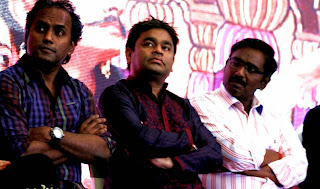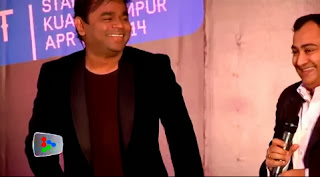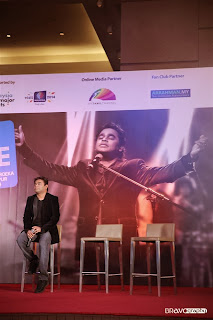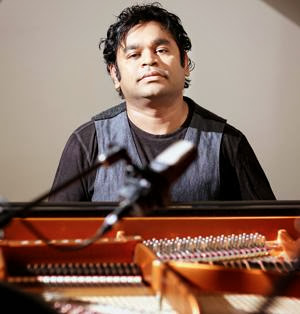Friday, February 28, 2014
Friday, February 21, 2014
A.R.Rahman : ‘Slumdog’ to symphonies
..........
It began in a car shed in Chennai, the southern Indian city formerly known as Madras. The year was 2008 and AR Rahman, the most successful composer in Indian history, was looking for a site for a music conservatoire – a place where young Indians could receive the western classical training that he felt was missing in his country. The parking lot behind the family home was the only available space.
Fast-forward to the present. Buoyed by the success of Slumdog Millionaire, the Danny Boyle film for which he won Academy Awards for best original score and best original song in 2009, Rahman has exchanged Bollywood for Hollywood, and his KM Music Conservatory has moved from its humble backyard origins to a purpose-built home occupying 40,000 sq ft.
It now has 80 full-time students, a teaching staff from the UK, US and Russia as well as India, and academic tie-ups with advanced music colleges in London and Glasgow. Last month, a group of its students visited the Scottish city to take part in a concert of Rahman's music. Next month, the BBC Scottish Symphony Orchestra will spend a week in Chennai giving concerts and masterclasses.
Rahman's initiative is notable not only as a philanthropic gesture (he provides most of the funding) but also as an educational model in India. Western classical music and its disciplines stand on the sidelines in a subcontinent of 1.3bn people where almost the entire music market is generated by the film industry.
It is even more surprising when you consider that Rahman, who has notched up 400m album sales and has 16m followers on his Facebook page, is enjoying a new career in Tinseltown – which, by his own admission, exists on a different creative planet from both India and Europe. His current projects include Disney'sMillion Dollar Arm, a biographical sports drama by Australian director Craig Gillespie (Lars and the Real Girl, Fright Night) andThe Monkeys of Bollywood, a musical film to be directed by Kevin Lima (Enchanted) with lyrics by Stephen Schwartz (Godspell).
Rahman, 47, may be classically trained but he makes no claims to being a classical composer. Most of his output consists of beat-based, synthesiser-modulated songs, representing a fusion of Indian influences and western pop. He has put Indian music on the international map to a degree not known since Ravi Shankar, who popularised the sitar.
Western composers, popular or classical, can only dream of Rahman's commercial reach, yet he devotes time and energy to an educational project with Chopin and Beethoven at its core, in a country where western musical tuition is scarce and expensive. He wants talented Indians to share some of the opportunities he had as a boy in a musically affluent Tamil family. His childhood influences included Italian opera, American pop and recording sessions with his father, a film composer, for whom he played keyboard. After his father's early death, he worked as a session player for bands and orchestras and took a diploma in western classical music through a scheme run by London's Trinity College of Music. He started composing advertising jingles in 1987 and was later invited by Mani Ratnam, one of India's best-known directors, to create the soundtrack forRoja(Rose), a Tamil-language thriller that won three national awards in 1992. That opened his career to the lucrative Hindi film market.
Rahman still performs. YouTube clips of his concerts show a serene figure sitting cross-legged centre stage, playing ahapji(a keyboard instrument with guitar frets) and surrounded by dancers, musicians and meticulously choreographed lighting. Despite clear western influences, the songs are inflected withgamakas, the fluid decorations characteristic of Indian melody. "It creates an emotion that is unparalleled," he says. "The idea of music is to liberate the listener and lead him to a frame where he feels he is elevated."
Born RS Dileep Kumar, he changed his name to Allah-Rakha Rahman after converting to Islam, his mother's religion, aged 23. Self-effacing and quietly charming, Rahman is the opposite of your brash movie mogul – but neither is there much of the charismatic guru about him. He usually has a business manager by his side, and seems happier talking about music production software Logic Pro X than about Bollywood, which he says "is really just Mumbai. It creates the impression that all Indian film is about glitzy girls and dancing. I don't like it."
He describes Hollywood as "like a holiday for me. I meet people I have adored [from afar] all my life." But he is under no illusions about the compromises involved in working there. In the past, he says, film composers would read the screenplay and come up with themes. "John Williams would play them on the piano to Steven Spielberg. It would then go to the scoring stage, to see how it sounded with an orchestra."
Today, soundtracks must follow "the demands of the number-crunchers. We have to mock up the whole orchestra on synthesiser. The more dollars the studio producers put in, the less freedom we have. If the budget hits $100m, they get scared – they'll take the existing score of a successful movie and expect composers to copy it, like wallpaper. The biggest challenge for any composer in Hollywood is to be as creative as possible within those boundaries."
The dictates of US film producers made Rahman determined to set up his own production company, and he already has a storyline for his first film. His love of Indian cinemastems, he says, from its capacity to cross language and ethnic barriers and the way it communicates "a spiritual elevation that gives contentment to the heart. That's how people on $50 dollars a month are able to survive. It's all a state of mind, whether you're low-income or high. Money is important, sure, but the goal is to give people a sense of happiness and fulfilment."
About his nurturing of a conservatoire in Chennai he says, "I want young Indian composers to be able to do more than just film music. I want to give them the skills that will enable them to create their own palette of sounds, instead of having to write formulaic music. It doesn't matter if they become sound engineers, producers, composers or performers – I want them to be as imaginative as they like. My aim is to expand sensibilities."
-------------------------------------------
'Million Dollar Arm' is on general release from May 16
Sent from BlackBerry® on Airtel
It began in a car shed in Chennai, the southern Indian city formerly known as Madras. The year was 2008 and AR Rahman, the most successful composer in Indian history, was looking for a site for a music conservatoire – a place where young Indians could receive the western classical training that he felt was missing in his country. The parking lot behind the family home was the only available space.
Fast-forward to the present. Buoyed by the success of Slumdog Millionaire, the Danny Boyle film for which he won Academy Awards for best original score and best original song in 2009, Rahman has exchanged Bollywood for Hollywood, and his KM Music Conservatory has moved from its humble backyard origins to a purpose-built home occupying 40,000 sq ft.
It now has 80 full-time students, a teaching staff from the UK, US and Russia as well as India, and academic tie-ups with advanced music colleges in London and Glasgow. Last month, a group of its students visited the Scottish city to take part in a concert of Rahman's music. Next month, the BBC Scottish Symphony Orchestra will spend a week in Chennai giving concerts and masterclasses.
Rahman's initiative is notable not only as a philanthropic gesture (he provides most of the funding) but also as an educational model in India. Western classical music and its disciplines stand on the sidelines in a subcontinent of 1.3bn people where almost the entire music market is generated by the film industry.
It is even more surprising when you consider that Rahman, who has notched up 400m album sales and has 16m followers on his Facebook page, is enjoying a new career in Tinseltown – which, by his own admission, exists on a different creative planet from both India and Europe. His current projects include Disney'sMillion Dollar Arm, a biographical sports drama by Australian director Craig Gillespie (Lars and the Real Girl, Fright Night) andThe Monkeys of Bollywood, a musical film to be directed by Kevin Lima (Enchanted) with lyrics by Stephen Schwartz (Godspell).
Rahman, 47, may be classically trained but he makes no claims to being a classical composer. Most of his output consists of beat-based, synthesiser-modulated songs, representing a fusion of Indian influences and western pop. He has put Indian music on the international map to a degree not known since Ravi Shankar, who popularised the sitar.
Western composers, popular or classical, can only dream of Rahman's commercial reach, yet he devotes time and energy to an educational project with Chopin and Beethoven at its core, in a country where western musical tuition is scarce and expensive. He wants talented Indians to share some of the opportunities he had as a boy in a musically affluent Tamil family. His childhood influences included Italian opera, American pop and recording sessions with his father, a film composer, for whom he played keyboard. After his father's early death, he worked as a session player for bands and orchestras and took a diploma in western classical music through a scheme run by London's Trinity College of Music. He started composing advertising jingles in 1987 and was later invited by Mani Ratnam, one of India's best-known directors, to create the soundtrack forRoja(Rose), a Tamil-language thriller that won three national awards in 1992. That opened his career to the lucrative Hindi film market.
Rahman still performs. YouTube clips of his concerts show a serene figure sitting cross-legged centre stage, playing ahapji(a keyboard instrument with guitar frets) and surrounded by dancers, musicians and meticulously choreographed lighting. Despite clear western influences, the songs are inflected withgamakas, the fluid decorations characteristic of Indian melody. "It creates an emotion that is unparalleled," he says. "The idea of music is to liberate the listener and lead him to a frame where he feels he is elevated."
Born RS Dileep Kumar, he changed his name to Allah-Rakha Rahman after converting to Islam, his mother's religion, aged 23. Self-effacing and quietly charming, Rahman is the opposite of your brash movie mogul – but neither is there much of the charismatic guru about him. He usually has a business manager by his side, and seems happier talking about music production software Logic Pro X than about Bollywood, which he says "is really just Mumbai. It creates the impression that all Indian film is about glitzy girls and dancing. I don't like it."
He describes Hollywood as "like a holiday for me. I meet people I have adored [from afar] all my life." But he is under no illusions about the compromises involved in working there. In the past, he says, film composers would read the screenplay and come up with themes. "John Williams would play them on the piano to Steven Spielberg. It would then go to the scoring stage, to see how it sounded with an orchestra."
Today, soundtracks must follow "the demands of the number-crunchers. We have to mock up the whole orchestra on synthesiser. The more dollars the studio producers put in, the less freedom we have. If the budget hits $100m, they get scared – they'll take the existing score of a successful movie and expect composers to copy it, like wallpaper. The biggest challenge for any composer in Hollywood is to be as creative as possible within those boundaries."
The dictates of US film producers made Rahman determined to set up his own production company, and he already has a storyline for his first film. His love of Indian cinemastems, he says, from its capacity to cross language and ethnic barriers and the way it communicates "a spiritual elevation that gives contentment to the heart. That's how people on $50 dollars a month are able to survive. It's all a state of mind, whether you're low-income or high. Money is important, sure, but the goal is to give people a sense of happiness and fulfilment."
About his nurturing of a conservatoire in Chennai he says, "I want young Indian composers to be able to do more than just film music. I want to give them the skills that will enable them to create their own palette of sounds, instead of having to write formulaic music. It doesn't matter if they become sound engineers, producers, composers or performers – I want them to be as imaginative as they like. My aim is to expand sensibilities."
-------------------------------------------
'Million Dollar Arm' is on general release from May 16
Sent from BlackBerry® on Airtel
Thursday, February 20, 2014
Monday, February 17, 2014
On the right note
A.R.Rahman on making experimental music with Imtiaz Ali, his two upcoming international releases, Mani Ratnam's next and a music album that releases later this month.
He's getting ready to walk the red carpet at the Berlin Film Festival with Highway director Imtiaz Ali and leads Randeep Hooda and Alia Bhatt. "It's cold here but not freezing, the sun is out," says AR Rahman, talking to Mirror from the German capital.
Back home, he has surprised many by appearing in the music video of Pataka Guddi with Alia. Is an acting career on the cards? "That's a different trip. I'd rather continue with my musical journey. There's so much left to explore" says the maestro.
He points out that the film offered him a lot of creative freedom to experiment with different things before they landed up with the final list of songs. "Even more challenging was the minimalistic background score. There were places where we decided not to have music and let the ambience speak," he reminisces.
After this road trip through six states, Rahman will set out on The Hundred-Foot Journey based on Richard C Morais's novel. The Mozart of Madras is looking forward to this adventure drama starring Helen Mirren, Om Puri and Manish Dayal. "I'm a great admirer of the Swedish director Lasse Hallstrom who's been nominated for the Oscars for My Life as a Dog and The Cider House Rules. His sensibilities are unique. I'm really excited," he exults. Produced by Steven Spielberg, Oprah Winfrey and Juliet Blake, the film opens on August 8.
Before that, the composer will have another international release on May 16--Walt Disney Pictures' biographical sports drama, Million Dollar Arm. "I've worked with a lot of artistes on this score, collaborated with rappers from the West. It's in the Slumdog Millionaire genre but goes forward and beyond. It's based on a true story (of baseball pitchers Rinku Singh and Dinesh Patel discovered by sports agent JB Bernstein after winning a reality show) which made it more interesting," he says.
For all those who believe that Rahman is on a highway to the West, he points out that there's the Rajnikanth starrer, the oneof-its-kind Kochadaiyaan - The Legend. "It's not real live-action and has been in the making for long but I'm proud to be associated with it," he asserts. He's also given the nod to Mani Ratnam's bilingual starring Aishwarya Rai Bachchan.
Confirming the news Rahman says, "It'll be nice to be working with Mani Sir again on an exciting, young project."
He's also given the nod to Imtiaz's Window Seat starring Ranbir Kapoor and Deepika Padukone. And there's Shekhar Kapur's Paani. "I'm glad this ambitious project is in the right hands now, it will happen the way it's meant to," he avers.
And if that's not enough, Rahman will also be releasing an album, Raunaq, on February 27 but won't divulge detials. You'll hear it soon," is all he will say.
With all that's happening, it's not surprising his son Ameen would want to stop a music session so his dad could get seven hours of sleep. "Living in a family we tend to take each other for granted till we get a wake-up call like this. Then it's like wow, this is what a family is about," he says.
But cruising down the highway of life, as we see in Imtiaz's upcoming film, can be an eye-opener and a mind-opener. "I've been travelling for the last 15 years, not on a truck but on an aeroplane. My kids miss me when I'm away but I don't mind living out of a suitcase. The UK, US, France, Germany, Iraq... it's such a thrill meeting people of different cultures, learning about and from them," he muses. "It's changed my perception about life, humanity and spirituality." Jai Ho!
Meanwhile, buzz is, he had objections to Sohail and Salman Khan using the title Jai Ho for their film? Rahman says, "After Slumdog Millionaire, Jai Ho became such a huge hit that I copyrighted the title. I gave an NOC to Sohail and Salman for their film, but if anyone outside India wants to use it, they will need my permission."
He's getting ready to walk the red carpet at the Berlin Film Festival with Highway director Imtiaz Ali and leads Randeep Hooda and Alia Bhatt. "It's cold here but not freezing, the sun is out," says AR Rahman, talking to Mirror from the German capital.
Back home, he has surprised many by appearing in the music video of Pataka Guddi with Alia. Is an acting career on the cards? "That's a different trip. I'd rather continue with my musical journey. There's so much left to explore" says the maestro.
He points out that the film offered him a lot of creative freedom to experiment with different things before they landed up with the final list of songs. "Even more challenging was the minimalistic background score. There were places where we decided not to have music and let the ambience speak," he reminisces.
After this road trip through six states, Rahman will set out on The Hundred-Foot Journey based on Richard C Morais's novel. The Mozart of Madras is looking forward to this adventure drama starring Helen Mirren, Om Puri and Manish Dayal. "I'm a great admirer of the Swedish director Lasse Hallstrom who's been nominated for the Oscars for My Life as a Dog and The Cider House Rules. His sensibilities are unique. I'm really excited," he exults. Produced by Steven Spielberg, Oprah Winfrey and Juliet Blake, the film opens on August 8.
Before that, the composer will have another international release on May 16--Walt Disney Pictures' biographical sports drama, Million Dollar Arm. "I've worked with a lot of artistes on this score, collaborated with rappers from the West. It's in the Slumdog Millionaire genre but goes forward and beyond. It's based on a true story (of baseball pitchers Rinku Singh and Dinesh Patel discovered by sports agent JB Bernstein after winning a reality show) which made it more interesting," he says.
For all those who believe that Rahman is on a highway to the West, he points out that there's the Rajnikanth starrer, the oneof-its-kind Kochadaiyaan - The Legend. "It's not real live-action and has been in the making for long but I'm proud to be associated with it," he asserts. He's also given the nod to Mani Ratnam's bilingual starring Aishwarya Rai Bachchan.
Confirming the news Rahman says, "It'll be nice to be working with Mani Sir again on an exciting, young project."
He's also given the nod to Imtiaz's Window Seat starring Ranbir Kapoor and Deepika Padukone. And there's Shekhar Kapur's Paani. "I'm glad this ambitious project is in the right hands now, it will happen the way it's meant to," he avers.
And if that's not enough, Rahman will also be releasing an album, Raunaq, on February 27 but won't divulge detials. You'll hear it soon," is all he will say.
With all that's happening, it's not surprising his son Ameen would want to stop a music session so his dad could get seven hours of sleep. "Living in a family we tend to take each other for granted till we get a wake-up call like this. Then it's like wow, this is what a family is about," he says.
But cruising down the highway of life, as we see in Imtiaz's upcoming film, can be an eye-opener and a mind-opener. "I've been travelling for the last 15 years, not on a truck but on an aeroplane. My kids miss me when I'm away but I don't mind living out of a suitcase. The UK, US, France, Germany, Iraq... it's such a thrill meeting people of different cultures, learning about and from them," he muses. "It's changed my perception about life, humanity and spirituality." Jai Ho!
Meanwhile, buzz is, he had objections to Sohail and Salman Khan using the title Jai Ho for their film? Rahman says, "After Slumdog Millionaire, Jai Ho became such a huge hit that I copyrighted the title. I gave an NOC to Sohail and Salman for their film, but if anyone outside India wants to use it, they will need my permission."
Source :
http://www.mumbaimirror.com/entertainment/bollywood/On-the-right-note/articleshow/30413298.cms
Sent from BlackBerry® on Airtel
Subscribe to:
Posts (Atom)

















































